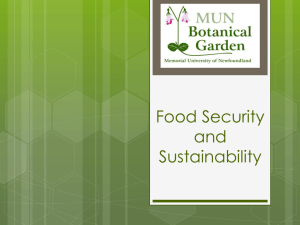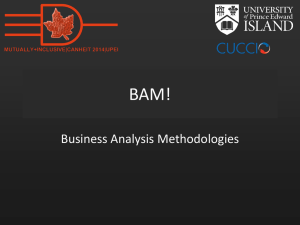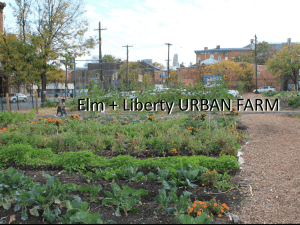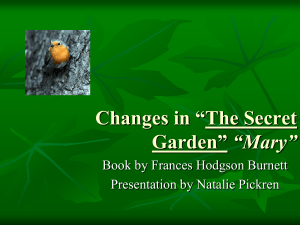Food Security and Sustainability (PowerPoint)
advertisement
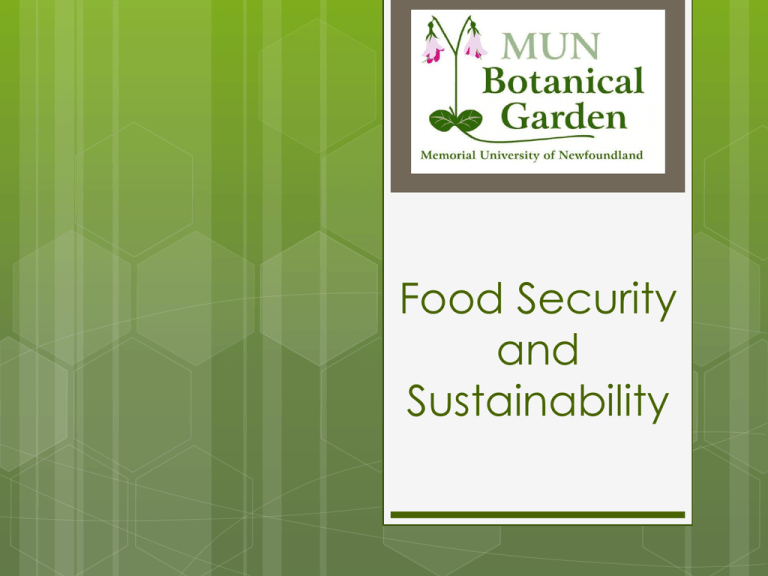
Food Security and Sustainability MUN Botanical Garden Food Security and Sustainability Where does our food come from in Canada? MUN Botanical Garden Food Security and Sustainability How about Newfoundland: Where does our Food Come From? MUN Botanical Garden Food Security and Sustainability Food Security Network Our province faces many challenges including: • We produce only 10% of fresh vegetables and have only a 2 3 day supply of fresh vegetables available; • The average age of farmers in the province is 55; • It is difficult to access local seafood; • We have the lowest consumption of fresh vegetables in Canada; • We have the highest rate of food bank usage in Canada; • We have the highest rate of obesity in Canada and the second highest rate of diabetes in Canada. MUN Botanical Garden Food Security and Sustainability FSN: 10 Ways to Eat Local Food 1. Learn What’s in Season 2. Find and Farm or Local Food Retailer 3. Visit a Farmers’ Market 4. Join a Community Supported Agriculture Program (CSA) 5. Start Gardening 6. Go Berry Picking 7. Wild Harvesting 8. Preserve the Harvest 9. Support Restaurants That Source Local Food 10. Sprout! MUN Botanical Garden Food Security and Sustainability FSN: 10 Ways to Eat Local Food 1. Learn What’s in Season: Root Cellars Rock: Resources MUN Botanical Garden Food Security and Sustainability FSN: 10 Ways to Eat Local Food 2. Find and Farm or Local Food Retailer MUN Botanical Garden Food Security and Sustainability FSN: 10 Ways to Eat Local Food 3. Visit a Farmers’ Market MUN Botanical Garden Food Security and Sustainability FSN: 10 Ways to Eat Local Food 4. Join a Community Supported Agriculture Program (CSA) (Consumer Shared Agriculture) Small bag is $448.00 for 14 weeks, $32 per week average. Large bag is $616.00 for 14 weeks, $44 per week average. Covers cost of everything The Organic Farm needs for farming: labour, fuel, equipment purchases and repairs as well as soil building materials. Payment can be by 4 post dated checks, but full amount up front helps cover labour costs early in the season before their crops are sufficient for group picking and distribution in the Veggie Coop. MUN Botanical Garden Food Security and Sustainability FSN: 10 Ways to Eat Local Food 5. Start Gardening MUN Botanical Garden Food Security and Sustainability FSN: 10 Ways to Eat Local Food 6. Go Berry Picking MUN Botanical Garden Food Security and Sustainability FSN: 10 Ways to Eat Local Food 7. Wild Harvesting MUN Botanical Garden Food Security and Sustainability FSN: 10 Ways to Eat Local Food 8. Preserve the Harvest MUN Botanical Garden Food Security and Sustainability FSN: 10 Ways to Eat Local Food 9. Support Restaurants That Source Local Food MUN Botanical Garden Food Security and Sustainability FSN: 10 Ways to Eat Local Food 10. Sprout! MUN Botanical Garden Food Security and Sustainability Food Politics Nourish: Food + Community Trailer MUN Botanical Garden Food Security and Sustainability But what about the food that doesn’t come from here. What’s the history of that food? Cocoa • Grown in Western Africa, Asia, and Latin America • 70% of the world’s supply from West Africa (mostly Ghana & the Ivory Coast) • Latin America supplies North America, Africa supplies Europe • Demand for cheap cocoa • Burkina Faso & Mali: trafficking of abducted children, enslavement, lack of education, dangerous work environment, never see family again WHAT CAN YOU DO? MUN Botanical Garden Food Security and Sustainability Food Ethics: Vote with your fork “Food justice seeks to ensure that the benefits and risks of where, what and how food is grown, produced, transported, distributed, accessed and eaten are shared fairly. Food justice represents a transformation of the current food system, including but not limited to eliminating disparities and inequities.” Robert Gottlieb & Joshi Anupama, Food Justice MUN Botanical Garden Food Security and Sustainability Why choose Organic Strict limits and prohibitions on the use of: • toxic and persistent pesticides • synthetic fertilizers • the routine use of drugs, antibiotics or synthetic hormones • animal cloning • genetic engineering (“GMOs”) • sewage sludge (“biosolids”) • Irradiation Organic standards also forbid the use of: • artificial food colours • artificial flavours • artificial sweeteners • Preservatives • many other processing aids and ingredients in processed foods. MUN Botanical Garden Food Security and Sustainability What is Fair Trade? MUN Botanical Garden Food Security and Sustainability Great Meals for a Change MUN Botanical Garden Food Security and Sustainability Learn More Read a good book: • Animal Vegetable Miracle, by Barbara Kingsolver (Eating local, gardening, cooking with recipes, and biology) • The Omnivore's Dilemma: A Natural History of Four Meals, by Michael Pollan (Discussion on where our food is grown, produced, and the health and ethics involved) • Edible Plants of Newfoundland and Labrador, by Peter Scott • The Botany of Desire: A Plant's-Eye View of the World, by Michael Pollan (How we use plants, and have changed them, but how we are influenced by them as well) • ? MUN Botanical Garden Food Security and Sustainability Learn More Watch: • All Around the Table: Preserving and Celebrating Seniors’ Food Knowledge, produced by the Food Security Network of NL • Botany of Desire (2009), (The history of four plants, each of which found a way to make itself essential to humans, thus ensuring widespread propagation) • Food, Inc. (2008), (all that is wrong in America’s industrialized food system; Michael Pollan) (was available on Netflix?) • To Make a Farm, (2011) (Young Canadians who want to start a farm) (available on TVO.org until May 15, 2018) Learn: • Food and Climate Change, David Suzuki Foundation • ? MUN Botanical Garden Food Security and Sustainability The Assignment • • • The Local• Economy• Carbon Footprint Plan a meal – list of ingredients Where do ingredients come from? How far did they travel? Food Would it be possible to substitute local foods? Security Nutritional Discuss 2-3 (or more) of below Our knowledge Value/Health and ability to of Your Food collect and grow food locally Were Newfoundlanders more self-sufficient 50-100 years ago? Why/Why Not MUN Botanical Garden Food Security and Sustainability The Assignment Use: maps, graphics, photos, charts etc. MUN Botanical Garden Food Security and Sustainability The Assignment Use: maps, graphics, photos, charts etc. MUN Botanical Garden Food Security and Sustainability The Assignment


